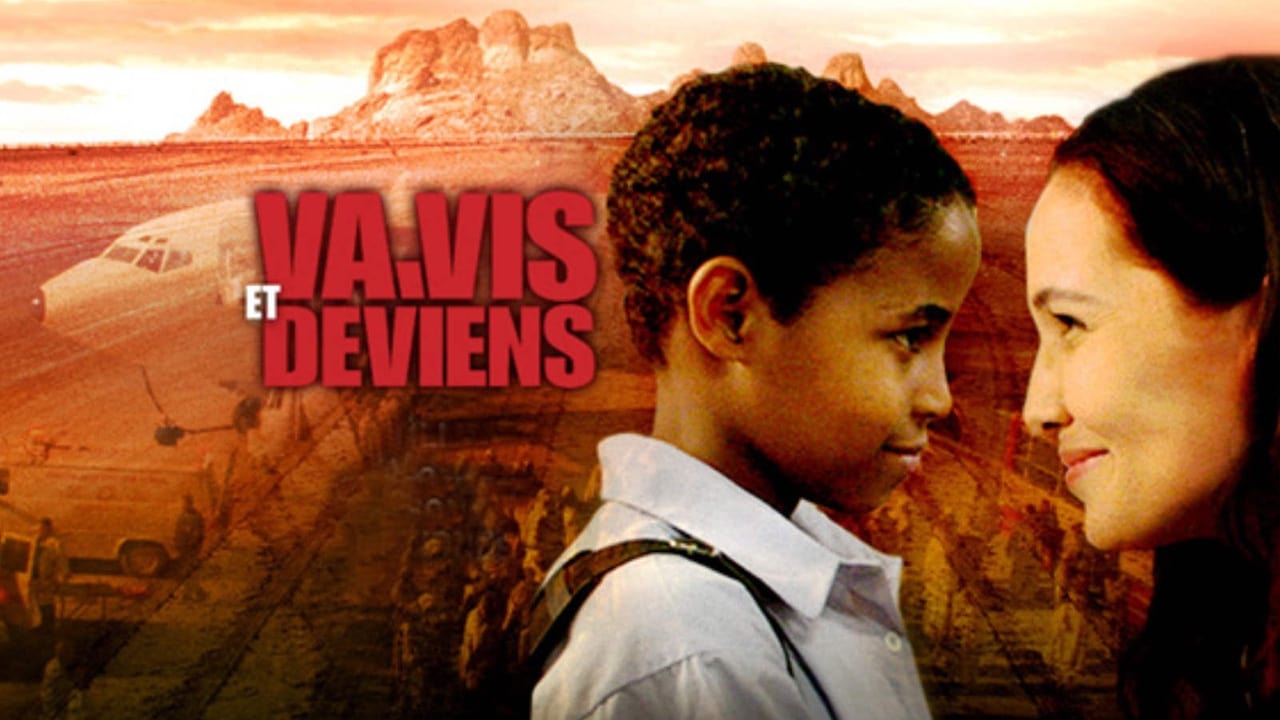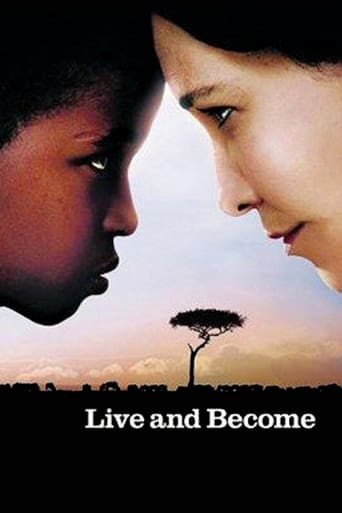

Masterful Movie
... View MoreGo in cold, and you're likely to emerge with your blood boiling. This has to be seen to be believed.
... View MoreEasily the biggest piece of Right wing non sense propaganda I ever saw.
... View MoreOne of the best movies of the year! Incredible from the beginning to the end.
... View More2008 is proving to be an outstanding year for all types of movies, from the sheer beautiful heart of Wall-E to the pure emotional powerhouse that "Live and Become" turns out to be.A human story of epic proportions takes us on an emotional roller-coaster as one child tries to be true to himself and survive in a world full of contradictions, pretty much like walking on an emotional minefield. Already devastated by a traumatic childhood, when he leaves him unable to connect with others as he adapts to a new life, a new family, a new religious culture that is both embracing and hostile at times."Live and Become" contains devastating moments, as Sholomon desperately tries not to sever his ties with the mother he left behind. There is plenty of emotional turmoil as he keeps who love from connecting with him. There is Yael, his adoptive mother, who unselfishly loves him and tries to support him throughout the story, and eventually we meet Sarah, another source of both love and disappointment for our protagonist.Until the very end, Sholomon appears to be in a state of emotional confusion, but he slowly begins to understand who truly loves him and understands him. Nothing prepares you for the devastating conclusion. "Live and Become" will make feel, look inside yourself, and hopefully will allow to be more understanding of those whose lives are not as fortunate as ours.
... View More"Va, vis, deviens" is not an ordinary film about Judaism or integration in a community.It is not story of a man between worlds and feelings.It is only radiography of a strange century, reflection of his errors and image of fragility of a space. A testimony of permanent search of real life's sense. Picture of daily fight with yourself for good definition of reality. Shlomo is not Jew.This is his fundamental sin and source of fear. In same time, Israelian society is, as his past, part of a single coin. He must be Jew against his dreams, hesitations or truth. He must be only Jew, against his painful memories and basic nostalgic image.So, the film is description of evolution in the skin of social role. Sequences of a vital trip to self-definition. Exploration of a society, vulnerable, fragile and obsessed by the shadow of stranger.Radu Mihaileanu's film is more that a beautiful story, version of new Cuore or pathetic pledge for empathy. It is a page of life's complexity, part of universal crisis present in the relation between West and East Germans after fall of Wall, between Romanians and Bessarabians after 1990.In a consistent measure, it is a subtle try to definite the Judaic faith and the Jew statute, the aspects of exile and symbols of reality. In fact, the film is a personal testimony about the role in a chimeric world of everyone. The question of Adam skin color is form of self-definition, form of self-discovery.An indirect confession of a great film director about his origins, expectation and his long and harsh fight for be yourself.
... View MoreI was very lucky to catch this film at the end of its run here in Washington, D.C. I found it absolutely stunning. One of the biggest issues it raised for me (and for the main character, I believe) was, in the face of the kind of devastation faced by Ethiopia in the 1980s, who should be saved, and why? I felt that a lot of Shlomo's anger, at society and at himself, resulted from his guilt at being one of the few survivors, which was compounded by the fact that, technically, he shouldn't have been one of the survivors since he wasn't Jewish. But this raises the larger question: why does a Jewish Ethiopian have a right to survive while a non-Jewish Ethiopian does not -- an issue that in a sense turns on its head the similar question raised by the Holocaust, when being Jewish was a death sentence rather than a basis for survival.The film is beautifully filmed and acted and touches on so many important and often difficult themes -- though generally with a light touch -- that it's hard to know where to begin. Most importantly, unlike most films I see these days, the drama in this film is real. It's too bad it's so hard to get a chance to see this film, but if you do get the chance, take it.
... View MoreI am amazed by the fact that this film did not get more advertising exposure. Perhaps, it is because it surrounds a theme particularly interesting if one is Jewish and even then the plight of the Falasha or black Ethiopian Jews is little known among the general Jewish population. Despite that, there is, I think, much in this film to which everyone can relate. It captured my soul and I was emotionally enmeshed in it. A black Christian Ethiopian young boy in a Sudanese refugee camp, because of the urging of his mother, pretends to be Jewish to get to Israel to escape the horrendous conditions he is in. It surrounds a dire conflict in Sudan which took place in the 1980's and the Israeli Operation Moses rescue which air-lifted those Ethiopian Jews caught in the middle of that struggle and brought them to Israel. It could, however, certainly be the Sudan that exists today, Iraq or anywhere the brutality of warfare occurs and the innocents who are swept up, enveloped, brutalized and killed by it. It centers around concepts of racism and man's inhumanity to man. It is also about love -- especially a mother's love for her child, a stranger's love and a love between two people which transcends race.For those who are Jewish, I think, it is an especially poignant film as it is about what it means to be a Jew, who is Jewish and how that is determined. It reflects the diversity in Israel itself about those core, ever-present and debatable issues which determine Israeli citizenship. It is about the plight of the Falasha or Ethiopian black Jews in Israel who are refugees and allowed entry into Israel solely based on their being Jewish. Sometimes, the larger Jewish populous who consider themselves white have ambivalent and less-than-welcoming feelings about the Falasha. Clearly, worldwide, being a Jew is more than being religious and this work points that out insightfully and with pathos. I have no criticism of the movie. I thoroughly enjoyed it.
... View More